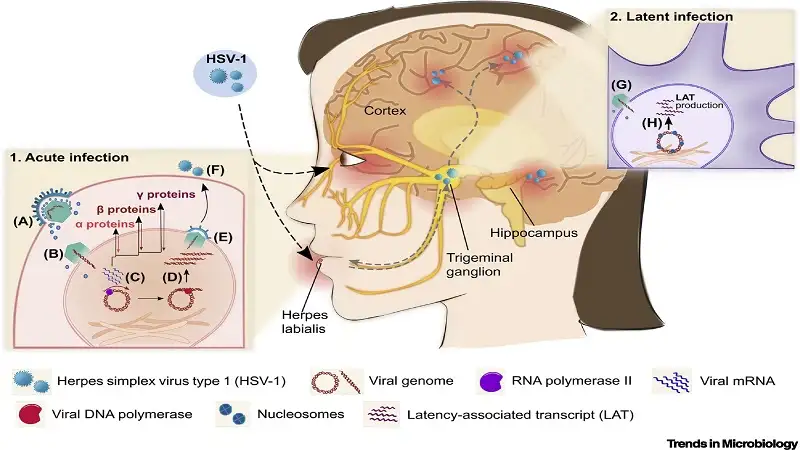Herpes Simplex Virus is one of the most common viral infections globally, affecting millions of people across all age groups. Despite its prevalence, this virus is often misunderstood, surrounded by stigma and misinformation. This comprehensive article explores every aspect of Herpes Simplex Virus (HSV), including its types, symptoms, transmission, treatment options, and ongoing research for better management.
What is Herpes Simplex Virus?
Herpes Simplex Virus (HSV) is a DNA virus that belongs to the family Herpesviridae. It is a contagious pathogen that primarily infects the skin and mucous membranes, causing painful blisters, sores, and other symptoms. The virus can remain dormant in nerve cells after the initial infection and reactivate at a later stage, leading to recurrent outbreaks.
HSV exists in two distinct types:
- HSV-1 (Herpes Simplex Virus Type 1): Predominantly responsible for oral herpes, which manifests as cold sores or fever blisters around the lips and mouth. In some cases, HSV-1 can also cause genital herpes.
- HSV-2 (Herpes Simplex Virus Type 2): Mainly causes genital herpes but can also result in oral infections, depending on the mode of transmission.
Both types of Herpes Simplex Virus are incurable but manageable with the help of modern medical treatments and preventive measures.
How is Herpes Simplex Virus Transmitted?
Herpes Simplex Virus spreads through direct contact with an infected person. The virus is highly contagious and can be transmitted in several ways:
- Oral Contact: HSV-1 spreads easily through kissing, sharing eating utensils, or using the same lip balm or toothbrush as someone with the virus.
- Sexual Contact: HSV-2 is transmitted through vaginal, anal, or oral sex. However, HSV-1 can also cause genital infections through oral-genital contact.
- Skin-to-Skin Contact: Even casual physical contact with active sores can spread the virus.
- Asymptomatic Shedding: The virus can still be transmitted when there are no visible symptoms, making it challenging to pinpoint the exact time of infection.
- From Mother to Child: Pregnant women with an active herpes outbreak can pass the virus to their baby during delivery, potentially leading to a severe condition called neonatal herpes.
Practicing good hygiene and safe behaviors is essential to limit the spread of Herpes Simplex Virus.
Symptoms of Herpes Simplex Virus
The symptoms of Herpes Simplex Virus vary depending on the individual, type of virus, and location of the infection. While some people experience severe outbreaks, others may have mild or no symptoms at all.
Primary Infection Symptoms
The first outbreak, known as the primary infection, is often the most intense and may include:
- Painful blisters or sores around the lips, mouth, genitals, or rectum.
- A burning or tingling sensation before the sores appear.
- Fever, fatigue, and muscle aches (common systemic symptoms).
- Swollen lymph nodes in the neck, groin, or other affected areas.
- Pain or discomfort during urination in cases of genital herpes.
Recurrent Symptoms
Once the primary infection subsides, Herpes Simplex Virus becomes dormant in the nerve cells but can reactivate, causing recurrent outbreaks. These are typically milder and shorter in duration and may include:
- Fewer and smaller sores compared to the initial outbreak.
- Tingling or itching in the affected area before sores reappear.
- Reduced systemic symptoms, such as fever or fatigue.
Triggers for recurrence include stress, illness, hormonal changes, sunlight exposure, or a weakened immune system.
Asymptomatic Cases
A significant percentage of people with Herpes Simplex Virus are asymptomatic. These individuals unknowingly carry and transmit the virus without experiencing visible outbreaks or discomfort.
Diagnosis of Herpes Simplex Virus
Accurate diagnosis is crucial for managing Herpes Simplex Virus effectively. Healthcare providers use a combination of clinical observation and laboratory tests to confirm the presence of HSV.
- Physical Examination: Doctors look for visible sores or lesions characteristic of HSV infections.
- Polymerase Chain Reaction (PCR): A highly sensitive test that detects HSV DNA from swabs of blisters or fluid samples.
- Viral Culture: A sample from a sore is used to grow and identify the virus in a laboratory setting.
- Blood Tests: Antibody testing helps determine past exposure to HSV and can distinguish between HSV-1 and HSV-2.
Early and accurate diagnosis enables better treatment planning and reduces the risk of complications.
Complications Associated with Herpes Simplex Virus
While Herpes Simplex Virus is manageable for most people, it can lead to severe complications in certain circumstances, especially if left untreated.
Neonatal Herpes
Pregnant women with active genital herpes pose a risk of transmitting the virus to their baby during childbirth. Neonatal herpes is a life-threatening condition that can cause brain damage, organ failure, or death if not treated promptly.
Ocular Herpes
Herpes Simplex Virus can infect the eye, leading to a condition called herpetic keratitis. If left untreated, it can cause scarring of the cornea, vision impairment, or even blindness.
Herpes Encephalitis
Rarely, HSV can infect the brain, causing encephalitis, a potentially fatal condition that requires immediate medical attention.
Psychological Impact
The stigma and misinformation surrounding Herpes Simplex Virus often lead to emotional distress, anxiety, or depression among those diagnosed. Education and support are vital to overcoming these challenges.
Treatment of Herpes Simplex Virus
Although there is no cure for Herpes Simplex Virus, various treatment options help manage symptoms, reduce outbreak frequency, and minimize transmission risks.
Antiviral Medications
Antiviral drugs are the most effective treatment for HSV infections. Commonly prescribed medications include:
- Acyclovir
- Valacyclovir
- Famciclovir
These drugs can be used in two ways:
- Episodic Treatment: Taken during outbreaks to shorten their duration and severity.
- Suppressive Therapy: Daily antiviral medications to prevent frequent outbreaks and reduce asymptomatic shedding.
Symptomatic Relief
Over-the-counter pain relievers, such as ibuprofen or acetaminophen, can alleviate discomfort during outbreaks. Topical creams and cold compresses also provide relief from pain and itching.
Natural Remedies
Some individuals find relief through home remedies like applying aloe vera gel, using lysine supplements, or consuming a balanced diet rich in immune-boosting nutrients.
Preventing Herpes Simplex Virus
Preventing Herpes Simplex Virus requires a combination of behavioral, medical, and hygienic strategies. While it’s impossible to eliminate the risk entirely, the following measures can significantly reduce the likelihood of transmission:
- Practice Safe Sex:
- Always use condoms or dental dams during sexual activity.
- Avoid sexual contact during active outbreaks.
- Avoid Sharing Personal Items:
- Do not share towels, eating utensils, or cosmetics with others.
- Communicate Openly:
- Discuss HSV status with sexual partners to make informed decisions about protection.
- Good Hygiene:
- Wash hands frequently and avoid touching sores to prevent spreading the virus to other parts of the body.
- Pregnancy Precautions:
- Pregnant women with HSV should consult their doctor to discuss antiviral medication and delivery options to prevent neonatal herpes.
Living with Herpes Simplex Virus
Receiving a diagnosis of Herpes Simplex Virus can be overwhelming, but it is not the end of the road. Millions of people live normal, healthy lives while managing HSV. Here are some tips for coping with the virus:
- Seek Support: Joining support groups or counseling can help you navigate the emotional challenges associated with HSV.
- Adopt Healthy Habits: A balanced diet, regular exercise, and stress management techniques can strengthen your immune system and reduce the frequency of outbreaks.
- Educate Yourself and Others: Understanding the virus and spreading accurate information helps combat stigma and promotes informed decision-making.
Remember, Herpes Simplex Virus is a manageable condition that does not define who you are.
Advancements in Herpes Simplex Virus Research
Researchers are making promising strides in the fight against Herpes Simplex Virus. Some key areas of focus include:
- Vaccine Development: Clinical trials are exploring vaccines to prevent HSV infections or reduce their severity.
- Gene Editing: Innovative techniques like CRISPR hold potential for targeting and disabling HSV DNA within the body.
- New Antiviral Medications: Scientists are developing novel drugs that aim to be more effective against resistant strains of the virus.
These advancements bring hope for improved treatment options and potentially a cure in the future.
Conclusion
Herpes Simplex Virus is a common but manageable condition that affects people worldwide. By understanding the virus, seeking timely medical care, and adopting preventive strategies, individuals can lead fulfilling lives while minimizing the risk of transmission. While there is no cure for HSV yet, ongoing research offers hope for better solutions in the years to come. Education, awareness, and compassion are essential to reducing the stigma surrounding Herpes Simplex Virus and supporting those living with it. Read More StarFame.




